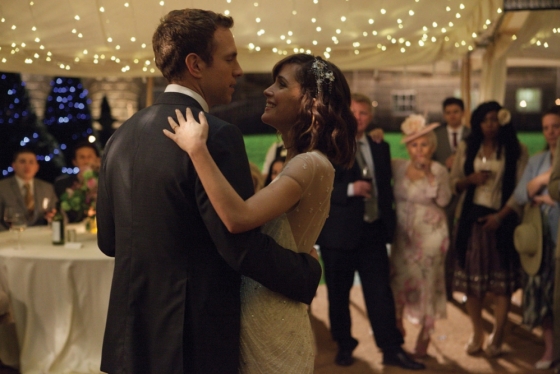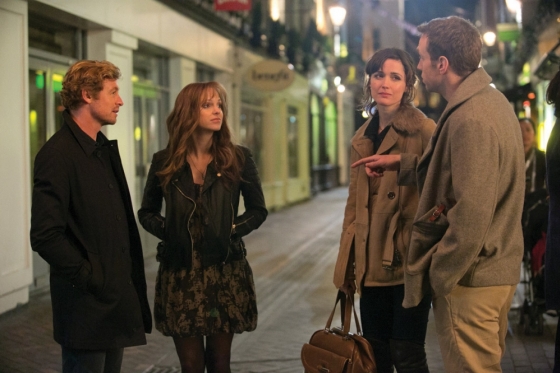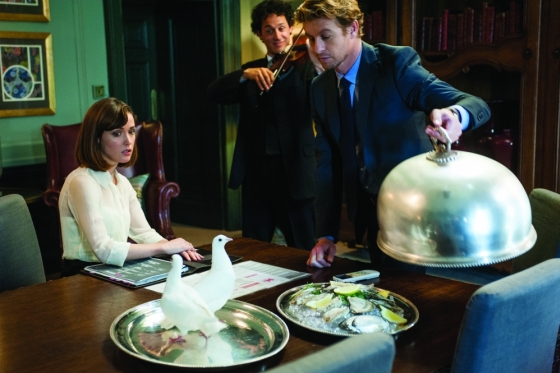|
All comedy stems from tragedy. Comedy cannot exist with a
dramatic premise because drama forms the situations of reality from
which a
narrative can exist and develop. What is said within these situations
becomes the
punchline. The stronger the situations and the more involving the drama
of the
story, the funnier the film should be. Modern comedies though often
fail to
acknowledge the dramatic value of a situation, hoping the jokes will
support
themselves.
I Give it a Year didn't draw a single laugh from
me. It forgoes the crucial rule of humour: comedy must exist in
reality. This
is an anomaly for the British studio Working Title Films whose films,
including
Love Actually and Notting Hill, have
grounded themselves
in both quiet observation and dry wit. With a script by first time
director Dan
Mazer, the plot and the characters here are both underdeveloped and the
jokes misfire
from unrealistic situations and dialogue.

Mazer is a long-time collaborator of Sacha Baron Cohen.
He
wrote and produced all three of Cohen's feature films, including Borat, which were American-UK
productions. Similarly, this film is crassly written as though Working
Title
Films had a broader demographic in mind, to whom the subject of sex
might still
seem like the high point of comedy.
The concept is not as subversive as Mazer claims it is
either. Josh (Rafe Spall) and Nat (Rose Byrne) are a couple who have
decided to
marry after seven months. None of their friends, including Nat's sister
(Minnie
Driver), believe that they will last. Two months later and they are
already in
counselling. Josh has written one book but has failed to grasp the
second. Nat
is working in an office and frustrated by Josh's complacency and his
annoying
best friend Danny (Stephen Merchant).

Josh becomes reacquainted with his ex-girlfriend Chloe
(Anna
Faris) and Nat is attracted to the smooth talking and successful
Guy
(Simon Baker), an American client who likes her but doesn't know that
she is
married. The familiar premise of two people already spoken for attaches
itself
to a gimmick where we are meant to realise that Josh and Nat don't
belong to
each other and are better suited to other partners.
The film postures as being about the aftermath
of
commitment, including the consequences of rushing into a marriage.
However,
this concept is not treated with any dramatic weight or seriousness for
the
situations to hold any trace of drama or tragedy. Instead, we're
reminded
frequently of why the couple is unsuited but the point is obvious and
laboured:
we're meant to laugh at a failing relationship that was never promising
to
begin with.

Mazer also diminishes the comedy by reducing
scenes into
disconnected skits, determined to embarrass characters, even the ones
that
we're meant to be rooting for. The characters are so thinly drawn that
it
disperses the likelihood of seeing them growing and having an emotional
attachment. Being made a slacker, Josh is the target for a lot of
juvenile
humiliations including: his in-laws
seeing naked photos of him! Or dancing drunkenly like Beyoncé
at Nat's work function!
The potential partners aren't free from this
degradation
either. Anna Faris has a terribly unfunny scene where she is squashed
under a would-be
threesome with her partner and another girl. Simon Baker, whose
performance
overloads on unctuousness, has his romantic credibility strained in a
stupid
scene where he brings a violinist and doves to a private board meeting
with Nat.
Would it spoil the gag to mention there is a fan in the room?

Stephan Merchant is a hugely talented comedian but his
role
is singular: to be as obnoxious as possible, reminding us how even
Josh's
friends repulsive to Nat. He echoes Spike from Notting Hill,
but minus anything resembling a character arc. He
exists to say unlikely things, like a wedding speech where he talks
about
having sex with bridesmaids. It's unbearably grating and not funny.
Much of the dialogue in I
Give it a Year resides
in this level of smuttiness to hold the
audience's
attention in the absence of drama and conflict. But comedy that retains
dramatic purpose is always preferable to comedy for comedy's sake. The
tragedy that should uphold the dramatic framework of the story must
be
relative to the characters, not the film itself.
|